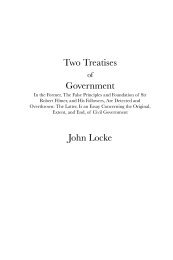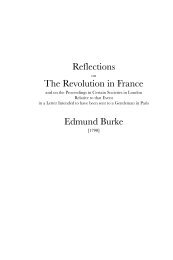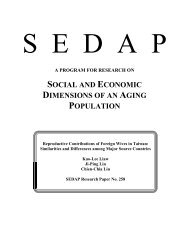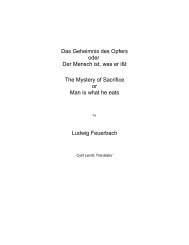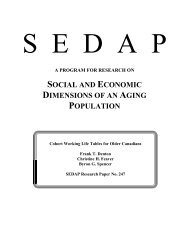AGRICULTUREwas made <strong>of</strong> their development. The existence <strong>of</strong>vigorous, able matrons was accepted as a matter <strong>of</strong>course. They embodied the <strong>seventeenth</strong> <strong>century</strong>idea <strong>of</strong> the " eternal feminine " and no one suspectedthat they might change with a changing environment.They themselves were too busy, too much absorbedin the lives <strong>of</strong> others, to keep journals and they werenot sufficiently important to have their memoirswritten by othir pe6ple.Perhaps their most authentic portraits may befound in the writings <strong>of</strong> the Quakers, who were largelydrawn from this class <strong>of</strong> the community. Theydepict <strong>women</strong> with an exalted devotion, supportingtheir families and strengthening their husbandsthrough the storms <strong>of</strong> persecution and amidstthe e$cting claims <strong>of</strong> religion.John Banks wrote from Carlisle Prison in 1648to his wife, " No greater Joy and Comfort I have inthis world. . . than to know that thou and a11thine are well both in Body and Mind . . .though I could be glad to see thee here, but do notstraiten thyself in any wise, for I am truly content tobear it, if it were much more, considering thy Concernsin this Season <strong>of</strong> the Year, being Harvest time and theJourney so long."I After her death he writes, " WeLived Comfortably together many Years, and she wasa Careful Industrious Woman in bringing up <strong>of</strong> herChildren in good order, as did become the Truth, inSpeech, Behaviour and Habit ; a Meet-Help and agood Support to me, upon the account <strong>of</strong> my Travels,always ready and willing to fit me with Necessaries,. . . and was never known to murmur, tho' I was<strong>of</strong>ten Concerned, to leave her with a weak Family,. . . She was well beloved amongst good Friends and<strong>of</strong> her Neighbours, as witness the several hundreds thatwere'at her Burial. . . . our Separation by Death,' Banks (John), Journal, p. Ior, 1684.AGRICULTUREwas the greatest Trial that ever I met with, above anythinghere below. Now if any shall ask, Why I havewrit so many Letters at large to be Printed . . .how can any think that I should do less than I havedone, to use all Endeavours what in me lay, to StrengthenandEncourage my Dear Wife, whom I so <strong>of</strong>ten,and for so many Years was made to leave as aforesaid,having pretty much concerns to look after."'Of another Quaker, Mary Batt, her father writes inher testimony that she was " Married to PhillipSyler <strong>of</strong> Waldon in the County <strong>of</strong> Somerset before sheattained the age <strong>of</strong> twenty years. . . . The Lordblessed her with Four Children, where<strong>of</strong> two dyedin their Infancy, and two yet remain alive : at theBurial <strong>of</strong> her Husband, for being present, she had twoCows valued at Nine Pounds taken from her, which,with many other Tryals during her Widowhood, shebore with much Patience,remained a Widow about four Years, the Lord drewthe affection <strong>of</strong> James Saylor . . . to seek herto be his Wife, and there being an answer in her, theLord joyned them together. To her Husband her45. . . After she hadLove and Subjection was suitable to that Relation,being greatly delighted in his Company, and a Meet-Help, a faithful Yoak-fellow, . . . and in hisAbsence, not only carefully discharging the duty asher Place as a Wife, but diligent to supply his Placein those affairs that more immediately concernedhim."' And her husband adds in his testimony, " Myoutward Affairs falling all under her charge (I,being absent, a Prisoner for my Testimony againstTythes) she did manage the same in such-care andpatience until the time she was grown big with Child,and as she thought near the time <strong>of</strong> her Travail (acondition much to be born with and pittyed) she thendesired so much Liberty as to have my Company homeBanks, (John), Journal, pp 129-30.' Batt (hlaryj, Pertrmony <strong>of</strong>the Lrfe and Death <strong>of</strong>, pp 1-3, 1683
AGRICULTURE AGRICULTURE 47two Weeks, and went herself to request it, whichsmall matter she could not obtain, but was denyed ;and as I understood by her, it might be one <strong>of</strong> thegreatest occasions <strong>of</strong> her grief which ever happenedunto her, yet in much Meekness and true Patienceshe stooped down, and quietly took up this her lastCross also, and is gone with it and all the rest, out <strong>of</strong> thereach <strong>of</strong> all her Enemies, . . . Three Nights andTwo Days before her Death, I was admitted to cometo her, though I may say (with grief) too late, yet itwas to her great joy to see me once more whom sheso dearly loved ; and would not willingly suffer meany more to depart out <strong>of</strong> her sight until she hadfinished her days, . . . Her Sufferings (in thecondition she was in) although I was a Prisoner, werefar greater then mine, for the whole time that shebecame my Wife, which was some Weeks above ThreeYears, notwithstanding there was never yet man,woman, nor child, could justly say, she had given themany <strong>of</strong>fence . . . yet must . . . unreasonable mencleanse our Fields <strong>of</strong> Cattle, rummage our House <strong>of</strong>Goods, and make such havock as that my Dear Wifehad not wherewithal to dress or set Food before meand her Children.'The duties <strong>of</strong> a Farmer's wife were described ahundred years earlier by Fitzherbert in the " Boke <strong>of</strong>Husbandrie." He begins the " Prologue for thewyves occupacyon," thus, " Now thou husbande thathast done thy diligence and laboure that longeth to ahusband to get thy liuing, thy wyues, thy children,and thy seruauntes, yet is there other thynges to bedoen that nedes must be done, or els thou shalt notthryue. For there is an olde common saying, thatseldom doth ye husbande thriue without leue <strong>of</strong> hiswyf. By thys saying it shuld seem that ther be otheroccupaci6s and labours that be most covenientBatt (Mary), Testimosy to Lifc and Dentb <strong>of</strong>, pp. 57, 1683.for the wyfes to do, and how be it that I haue not theexperience <strong>of</strong> all their occupacyions and workes as Ihaue <strong>of</strong> husbandry, yet a lytel wil I speake what theyought to do though I tel the not how they shoulddo and excersyse their labour and occupacions.A lerson for the wyfe . . . alway be doyng<strong>of</strong> some good workes that the deuil may fynde thealway occupied, for as in a standyng water are engendredwormes, right so in an idel body are engenderedydel thoughtes. Here maie thou see yt <strong>of</strong> idelnescommeth damnatib, & <strong>of</strong> good workes and labourcommeth saluacion. Now thou art at thy libertie tochose whither waye thou wilte, wherein is greatdiversite. And he is an unhappye man or woman thatgod hath given both wit & reason and putteth him inchoise & he to chose the worst part. Nowe thouwife I trust to shewe unto the diuers occupacions,workes and labours that thou shalt not nede to beydel no tyme <strong>of</strong> ye yere. What thinges the wife isbounde <strong>of</strong> right to do. Firste and principally the wyfeis bound <strong>of</strong> right to loue her husband aboue fatherand mother and a1 other men . . .What workes a wyfe should do in generall.Firstin the mornyng when thou art wakCd and purposeto rise, lift up thy had & blis the & make a signe <strong>of</strong>the holy crosse . . . and remembre thy makerand thou shalte spede muche the better, & when thouart up and readye, then firste swepe thy house ;dresse up thy dyscheborde, & set a1 thynges in goodorder within thy house, milke ye kie, socle thy calues,sile up thy milke, take up thy children & aray th~,& provide for thy husbandes breakefaste, diner,Souper, & for thy children & seruauntes, & take thyparte wyth them. And to ordeyne corne & malt tothe myll, to bake and brue withall wh~ nede is.And mete it to the my11 and fro the myll, & se thatthou haue thy mesure agayne besides the tole or ellesthe mylner dealeth not truly wyth the, or els thy corne
- Page 1 and 2: WORKING LIFE OF WOMENIN THESEVENTEE
- Page 3 and 4: PREFACEboth can be studied in the w
- Page 5 and 6: 2 INTRODUCTORY INTRODUCTORY 3is det
- Page 7 and 8: INTRODUCTORYThese circumstances hav
- Page 9 and 10: 10 INTRODUCTORY INTRODUCTORYthis pe
- Page 11 and 12: CAPITALISTSTerm includes aristocrac
- Page 13 and 14: CAPITALISTSA granddaughter of Olive
- Page 15 and 16: CAPITALISTSsuch as noe way entangle
- Page 17 and 18: 26 CAPITALISTS CAPITALISTS 27Wellin
- Page 19 and 20: 30 CAPITALISTS CAPITALISTS 3'years
- Page 21 and 22: CAPITALISTSboth, so that there coul
- Page 23 and 24: 38 CAPITALISTShis Lady was taking d
- Page 25: AGRICULTURE 43AGRICULTUREAgricultur
- Page 29 and 30: AGRICULTUREFitzherbert's descriptio
- Page 31 and 32: 54 AGRICULTUREamong the gentry. The
- Page 33 and 34: 5 8 AGRICULTURE AGRICULTURE 59was u
- Page 35 and 36: 62 AGRICULTURE AGRICULTURE 63" Spre
- Page 37 and 38: AGRICULTUREthe same work,' a marrie
- Page 39 and 40: AGRICULTUREThe Justices in the Nort
- Page 41 and 42: AGRICULTUREIn some places the labou
- Page 43 and 44: AGRICULTURELabourers naturally were
- Page 45 and 46: 82 AGRICULTURE AGRICULTUREdenyed a
- Page 47 and 48: AGRICULTUREpayne of xs a weeke and
- Page 49 and 50: AGRICULTUREThe conduct of the magis
- Page 51 and 52: 94 TEXTILES TEXTILESIt requires som
- Page 53 and 54: TEXTILESchildren were said to be em
- Page 55 and 56: TEXTILES TEXTILES 103respect obtain
- Page 57 and 58: TEXTILES TEXTILES'07people who had
- Page 59 and 60: I 10 TEXTILES TEXTILES I111693 to p
- Page 61 and 62: I 14 TEXTILES TEXTILES 115books,' b
- Page 63 and 64: 118 TEXTILES TEXTILES 119money in p
- Page 65 and 66: 122 TEXTILES TEXTILES 123clothing w
- Page 67 and 68: 126 TEXTILES TEXTILESclosely imitat
- Page 69 and 70: 1 30TEXTILESspinsters' maximum wage
- Page 71 and 72: TEXTILESa mownte in the yere t o jM
- Page 73 and 74: '38 TEXTILES TEXTILESD. Silk, and G
- Page 75 and 76: 142TEXTILES TEXTILES '43end. And it
- Page 77 and 78:
TEXTILESbranches of the woollen ind
- Page 79 and 80:
CRAFTS AND TRADESCHAPTER V.--CRAFTS
- Page 81 and 82:
CRAFTS AND TRADES CRAFTS AND TRADES
- Page 83 and 84:
I 58CRAFTS AND TRADESwith the wife
- Page 85 and 86:
CRAFTS AND TRADES CRAFTS AND TRADES
- Page 87 and 88:
CRAFTS AND TRADES. . . . shall teac
- Page 89 and 90:
I 70 CRAFTS AND TRADES CRAFTS AND T
- Page 91 and 92:
CRAFTS AND TRADESone month the Mast
- Page 93 and 94:
178 CRAFTS AND TRADES CRAFTS AND TR
- Page 95 and 96:
182 CRAFTS AND TRADES CRAFTS AND TR
- Page 98 and 99:
I 88 CRAFTS AND TRADES CRAFTS AND T
- Page 100 and 101:
192 CRAFTS AND TRADESIn the unprote
- Page 102 and 103:
CRAFTS AND TRADESand eleven sisters
- Page 104 and 105:
200 CRAFTS AND TRADES CRAFTS AND TR
- Page 106 and 107:
CRAFTS AND TRADES CRAFTS AND TRADES
- Page 108 and 109:
CRAFTS AND TRADESBut if a woman be
- Page 110:
2 12 CRAFTS AND TRADES CRAFTS AND T
- Page 114 and 115:
CRAFTS AND TRADES CRAFTS AND TRADES
- Page 116 and 117:
CRAFTS AND TRADESalso defended as a
- Page 120 and 121:
CRAFTS AND TRADESfrom her fellow pa
- Page 122 and 123:
PROFESSIONS 237PROFESSIONSIntroduct
- Page 124 and 125:
24O PROFESSIONS PROFESSIONStheir Th
- Page 126 and 127:
244 PROFESSIONS PROFESSIONS 245the
- Page 128 and 129:
PROFESSIONS PROFESSIONS 249profanat
- Page 130 and 131:
252PROFESSIONSGiles Moore enters in
- Page 132 and 133:
PROFESSIONScribed as one who " dist
- Page 134 and 135:
PROFESSIONS PROFESSIONS 261first ma
- Page 136 and 137:
264 PROFESSIONSGarrett's leg shall
- Page 138 and 139:
268 PROFESSIONSwhere there are none
- Page 140 and 141:
PROFESSIONS PROFESSIONS 273the numb
- Page 142 and 143:
PROFESSIONSexaminations, before six
- Page 144 and 145:
PROFESSIONS PROFESSIONS 281death me
- Page 146 and 147:
284 PROFESSIONS PROFESSIONSof confi
- Page 148 and 149:
288 PROFESSIONSextent they were whe
- Page 150 and 151:
CONCLUSIONor in her other facilitie
- Page 152 and 153:
CONCLUSION CONCLUSION 297in women's
- Page 154 and 155:
CONCLUSIONlaw of Nature, inviolable
- Page 156 and 157:
CONCLUSIONwere specially deprecated
- Page 158 and 159:
308 CONCLUSIONof the State, and the
- Page 160 and 161:
312 AUTHORITIES AUTHORITIES 313Cost
- Page 162 and 163:
AUTHORITIESMartindale, Adam, The Li
- Page 164 and 165:
County.Buckingham ..Cardigan .. ..C
- Page 166 and 167:
INDEXINDEXFlax, 64, 146, 246, 291 ;
- Page 168:
INDEXsmants, women( 50,65,157 ; mam



